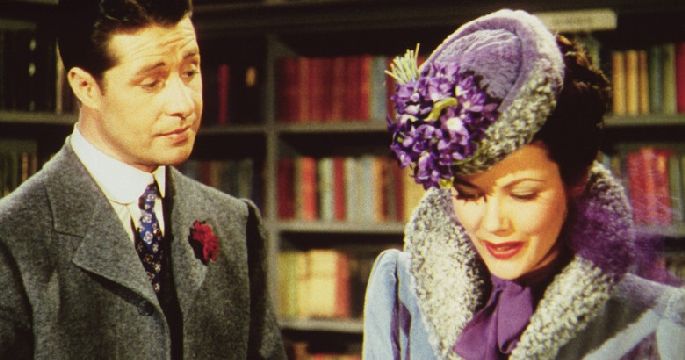Heaven Can Wait (1943) 

Director: Ernst Lubitsch
Cast: Gene Tierney, Don Ameche, Charles Coburn
Synopsis: An old roué arrives in Hades to review his life with Satan, who will rule on his eligibility to enter the Underworld.
Heaven Can Wait was director Ernst Lubitsch’s first movie for 20th Century-Fox after more than a decade at Paramount, and his new studio must have wondered what it had let itself in for when he insisted that he wanted to make a picture about “a man only interested in good living with no aim of accomplishing anything or doing anything noble.” Of course, he faced opposition in his desire to make a movie that “had no message and made no point whatsoever,” but Heaven Can Wait was a project he was determined to make. He was going through a period of emotional upheaval in his life due to an acrimonious divorce from his wife of nine years, and one of the complaints she made about him was that he was pre-occupied with satisfying his own appetites with no regard to the effect his pursuit of them had on those around him, and it’s significant that Henry Van Cleve, the lead character of Heaven Can Wait, shared exactly the same characteristics.
Henry Van Cleve (Don Ameche) comes from a wealthy New York family and has enjoyed a privileged life, which comes to an end the day after his 70th birthday. Henry presents himself at an antechamber to Hell, where he’s greeted by the Devil himself (Laird Cregar), whom Henry addresses as Your Excellency. Although Henry assumes he’s headed downstairs because of his many indiscretions while alive, His Excellency decides to review his case, and invites Henry to recall his life in detail. This Henry does by relating the significant incidents of his time on earth to those women who played the most important parts in his life. There then follows a series of lengthy flashbacks tracing Henry’s life from the cradle to his deathbed.
The first of these is, of course his mother (Spring Byington — Werewolf of London, Roxie Hart) and grandmother (Clara Blandick — The Wizard of Oz, Drums Along the Mohawk), who bicker constantly over him. Then, from nine-year-old Mary (Marlene Mains), Henry learns that “if you want to win a girl, you have to have lots of beetles.” Perhaps more significantly, Mademoiselle (Signe Hasso — The House on 92nd Street), the household’s French maid, explains to 13-year-old Henry that ‘Kiss is like candy. You eat candy only for the beautiful taste, and this is enough reason to eat candy,’ before proceeding to get him drunk, much to the consternation of his concerned mother and father (Louis Calhern). The most significant woman in Henry’s life, however, is Martha (Gene Tierney — Laura, The Razor’s Edge), the vivacious Kansas girl he makes his wife after stealing her away from his prissy cousin, Albert (Allyn Joslyn) at their engagement party.
Although episodic in nature, Heaven Can Wait nevertheless has a narrative flow that defies both its structure and its stage origins. Quite how Lubitsch managed to make the hero of his tale such a serial-philanderer without feeling the wrath of the censor is a mystery. Henry’s ‘misdemeanours’ are all implied, it’s true, but even so, the implication is crystal clear, and yet the affability of his character, helped immeasurably by a career-best performance from Ameche, one of cinema’s most lightweight leading men, makes it impossible to miss the fact that Henry is a good man with a flaw he is powerless to overcome. The characters in the movie realise this, but find it in themselves to forgive him, as does the audience. Of course, it helps that Sam Raphaelson’s polished script glosses over most of the heartache and pain Henry’s poor wife must have suffered over the years.
The gentle humour within Heaven Can Wait is touched with poignancy in the way in which each new episode in Henry’s life is marked by the absence of a key figure from his earlier years. First Grandmother, then father, then mother and so on. Often, their absence is barely — if at all — mentioned, but there is something quietly heart-breaking in the way they emphasise the fact that too often life is a series of goodbyes. But overall, the tone is light and devilish, and while it might not have the Lubitsch touch that the director’s earlier films for Paramount possessed, it’s nevertheless a fine example of the kind of quality entertainment Hollywood was capable of producing in its heyday.
(Reviewed 3rd August 2014)
httpv://www.youtube.com/watch?v=-iS_t1iSUbw
